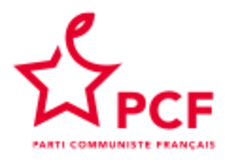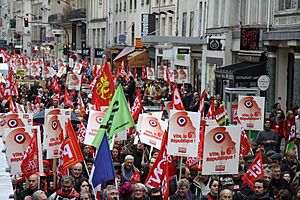French Communist Party facts for kids
Quick facts for kids <div style="padding-top:0.3em; padding-bottom:0.3em; border-top:2px solid Lua error in Module:European_and_national_party_data/config at line 227: attempt to index field 'data' (a nil value).; border-bottom:2px solid Lua error in Module:European_and_national_party_data/config at line 227: attempt to index field 'data' (a nil value).; line-height: 1;">
French Communist Party
Parti communiste français
|
|
|---|---|
 |
|
| Abbreviation | PCF |
| National Secretary | Fabien Roussel |
| Spokespersons |
|
| Founders |
|
| Founded | 30 December 1920 |
| Split from | French Section of the Workers' International |
| Headquarters | Headquarters of the French Communist Party, 2, place du Colonel Fabien – 75019 Paris |
| Newspaper | L'Humanité |
| Student wing | Union of Communist Students |
| Youth wing | Mouvement Jeunes Communistes de France |
| Overseas wing | Secteur international du PCF |
| Membership (2023) | |
| Ideology |
Historical Marxism–Leninism (Until 1979) Eurocommunism |
| Political position | Left-wing Historical Far-left |
| National affiliation |
|
| European affiliation | Party of the European Left |
| International affiliation |
|
| Colors | Red |
| Anthem | "The Internationale" |
| National Assembly | Lua error in Module:European_and_national_party_data/config at line 227: attempt to index field 'data' (a nil value). |
| Senate | Lua error in Module:European_and_national_party_data/config at line 227: attempt to index field 'data' (a nil value). |
| European Parliament | Lua error in Module:European_and_national_party_data/config at line 227: attempt to index field 'data' (a nil value). |
| Presidency of Regional Councils |
0 / 17
|
| Presidency of Departmental Councils |
0 / 95
|
| Website | |
| Lua error in Module:European_and_national_party_data/config at line 227: attempt to index field 'data' (a nil value). | |
|
Until 2008, the party was also member of Popular Front (1936–1938), CNFL (1940–1947) and the Plural Left (1997–2002) |
|
The French Communist Party (called Parti communiste français or PCF in French) is a political party in France that follows the ideas of communism. Communism is a political idea that supports creating a society where property is owned by the community. The PCF is a member of the Party of the European Left.
The party was created in 1920. Its founders were inspired by the 1917 Russian Revolution. For many years, it was one of the most powerful parties in France. After World War II, it often received more than 20% of the vote in elections.
During the war, the PCF was a very important part of the French Resistance against the German occupation. After France was freed in 1944, the party helped run the government for a few years.
In recent years, the PCF has become less popular in national elections. However, it is still very influential in local politics in many parts of France. The party works with other left-wing groups, such as the New Popular Front, to win elections.
Contents
History of the Party
How the PCF Began
The French Communist Party was started in 1920. It was formed by members who left a socialist party called the French Section of the Workers' International (SFIO). These members wanted to follow the example of the Bolsheviks who led the Russian Revolution. One of the early members who helped create the party was Ho Chi Minh, who later became the leader of Vietnam.
In its early years, the party focused on helping workers and fighting against colonialism. At the time, France had colonies around the world. The PCF was one of the few groups in France that supported independence for these colonies. For example, they supported people in Morocco and Syria who were fighting for freedom from French rule.
The Popular Front and World War II
In the 1930s, a dangerous political movement called fascism was growing in Europe. To fight against it, the PCF joined with other left-wing parties to form the Popular Front. This group won the 1936 election. The PCF supported the new government but did not take part in it.
When World War II began, the French government banned the PCF. This was because the Soviet Union, the world's main communist country, had signed a non-aggression pact with Nazi Germany. After Germany invaded France in 1940, the PCF began to organize resistance against the occupiers.
In 1941, the PCF created a resistance group called the National Front. This group, along with its armed fighters, became a key part of the French Resistance. They worked with other resistance groups and the "Free France" government led by Charles de Gaulle.
After the War
When the war ended in 1944, the PCF was very popular and powerful. It joined the new French government and helped create important social reforms. However, in 1947, the PCF was forced out of the government. This was because of growing tensions between the Soviet Union and Western countries like the United States (the start of the Cold War).
For the next 30 years, the PCF remained a major party but was kept out of the national government. It still had strong support, especially from workers.
Recent Decades
In the 1970s, the PCF began to lose voters to the Socialist Party. In 1981, the PCF joined the government of President François Mitterrand, a Socialist. They left the government in 1984.
Since then, the party's support has continued to decline in national elections. In 2009, the PCF helped form an alliance called the Left Front with other left-wing parties. This helped them win more votes for a time.
Today, the party is led by Fabien Roussel. He ran for president in 2022 and received 2.28% of the vote. While the party is smaller than it used to be, it remains an important voice in French politics, especially at the local level.
What the Party Believes In
The French Communist Party is a left-wing party. This means it supports ideas like social equality, workers' rights, and a strong role for the government in the economy.
Overcoming Capitalism
A core belief of the PCF is its opposition to capitalism. Capitalism is an economic system where businesses are owned by private individuals. The PCF believes this system is unfair and creates problems like inequality and environmental damage.
The party wants to "overcome" capitalism and replace it with a more equal and humane society. It supports ideas like human rights, democracy, and equal dignity for every person, no matter their gender, race, or background.
Views on Europe
The PCF is generally seen as Eurosceptic. This means it is critical of the European Union (EU). The party believes the EU's rules often favor big businesses over ordinary people. It wants to change the EU to focus more on social progress and democracy.
Social Issues
The party's views on social issues have changed over time. In the past, it was more traditional. Today, the PCF strongly supports feminism and gender equality. It also supports the rights of gay people, including same-sex marriage and adoption.
On immigration, the PCF now supports giving legal status to immigrants who do not have official papers. This is a change from its position in the 1980s.
The Party's Organization
The PCF used to be a "mass party" with a very large number of members. In 1978, it had over 500,000 members. Today, the number is much smaller, with around 42,000 members in 2023.
The party is supported by a major trade union, the General Confederation of Labour (CGT), and a newspaper, L'Humanité. L'Humanité was founded in 1904 and has a long history with the party.
Every year, the party holds a large festival called the Fête de l'Humanité. It features music, debates, and stands from political groups from around the world. It is one of the biggest festivals in France.
Where the PCF is Popular
The PCF has strong support in certain areas of France. These are often working-class suburbs around big cities like Paris (known as the ceinture rouge or "red belt"), Lyon, and Marseille.
It is also popular in former industrial and mining regions, such as in northern and central France. Some rural areas with a history of anti-clericalism (being against the influence of the church in politics) also tend to vote for the PCF.
Communist-led local governments have a reputation for providing good public services. These include public housing, parks, day nurseries, and swimming pools.
Election Results
Presidential Elections
The PCF has put forward a candidate in most presidential elections. In some years, it has supported a candidate from another left-wing party.
- 1969: Jacques Duclos won 21.3% of the vote, finishing in third place.
- 1981: Georges Marchais won 15.4% of the vote.
- 2012: The PCF supported Jean-Luc Mélenchon, who won 11.1% of the vote.
- 2017: The PCF again supported Jean-Luc Mélenchon.
- 2022: Fabien Roussel won 2.28% of the vote.
National Assembly Elections
The party's strength in the National Assembly (France's main house of parliament) has varied over the years.
- 1946: The PCF had its best result, winning 28.3% of the vote and 182 seats.
- 1978: The party won 20.6% of the vote and 86 seats.
- 2002: The party's support fell to 4.8%, giving it 21 seats.
- 2024: As part of the New Popular Front, the PCF won 8 seats.
See also
 In Spanish: Partido Comunista Francés para niños
In Spanish: Partido Comunista Francés para niños
- Communism in France
- Place du Colonel Fabien
- MRAP, anti-racist NGO, created in 1941


